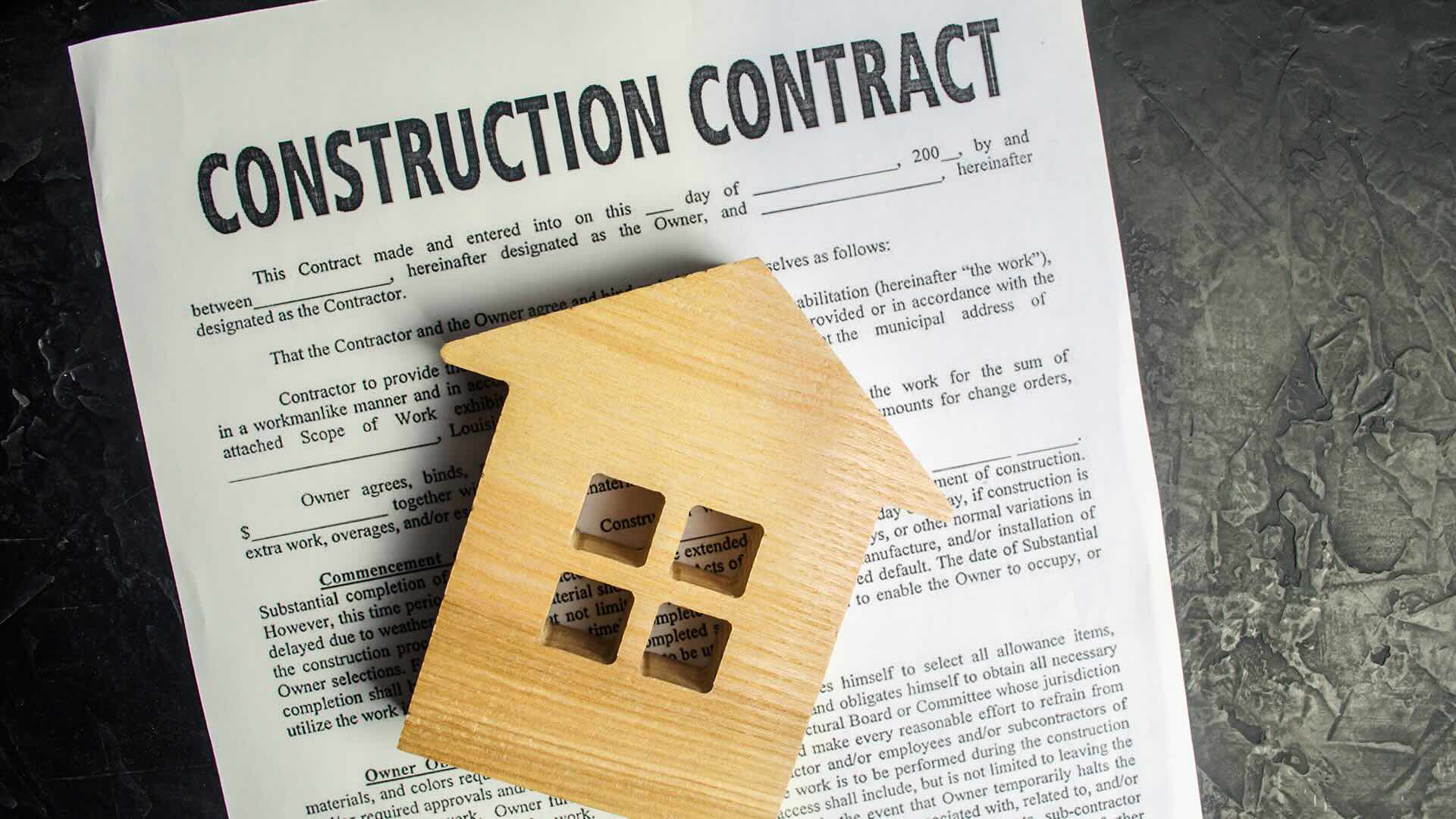Home>diy>Building & Construction>What Is A Construction Contract


Building & Construction
What Is A Construction Contract
Modified: December 7, 2023
Learn the basics of a construction contract, including its purpose, key components, and legal implications. Discover how building construction projects are managed and executed.
(Many of the links in this article redirect to a specific reviewed product. Your purchase of these products through affiliate links helps to generate commission for Storables.com, at no extra cost. Learn more)
Introduction
Welcome to the world of construction projects, where dreams take shape and buildings rise from the ground. In the dynamic and intricate world of construction, one essential element that ensures smooth operations and protects the rights of all parties involved is the construction contract.
A construction contract serves as the legal framework that defines the rights, responsibilities, and obligations of all parties throughout the construction project. It acts as a foundation, providing clarity and structure to the project, and minimizing potential disputes or misunderstandings.
In this article, we will explore the definition, key components, types, and importance of construction contracts. We will also discuss some of the common challenges and considerations that arise in construction contracts.
So, let’s put on our hard hats and dive into the world of construction contracts, where every word and clause truly matters!
Key Takeaways:
- Construction contracts are essential legal agreements that provide clarity, protect rights, allocate risks, and ensure fair payment, promoting successful and harmonious construction projects.
- Careful consideration of contract type, comprehensive terms, and effective communication can minimize challenges and contribute to the success of construction projects.
Definition of a Construction Contract
A construction contract can be defined as a legally binding agreement between two or more parties involved in a construction project. It outlines the terms and conditions under which the project will be carried out, including specifications, timelines, payment terms, and other important details.
Construction contracts are typically drafted between the owner or client of the project, and the contractor or construction company responsible for executing the project. However, depending on the complexity of the project, there may be additional parties involved, such as subcontractors, consultants, or suppliers.
The construction contract acts as a mutual agreement that protects the interests of all parties involved. It serves as a roadmap, guiding the project from its inception to its completion. By clearly defining the roles and responsibilities of each party, a construction contract helps to prevent disputes and ensure that the project is completed successfully and in accordance with the agreed-upon terms.
Some of the key elements typically included in a construction contract are:
- Project description: A detailed description of the project, including location, scope, and any specific requirements or specifications.
- Timeline: The agreed-upon timeline for the project, including start and completion dates, as well as any intermediate milestones.
- Price and payment terms: The total price of the project, payment schedule, and any additional costs or allowances. This section may also cover issues such as retainage, which is a percentage of each payment held back by the owner to ensure completion of the project.
- Insurance and liabilities: The insurance requirements for the project, as well as the allocation of risks and liabilities among the parties involved.
- Dispute resolution: The mechanisms for resolving any disputes or disagreements that may arise during the course of the project, such as mediation, arbitration, or litigation.
It is important to note that construction contracts may vary in their structure and content depending on the nature of the project and the legal requirements of the jurisdiction in which it is carried out. It is advisable to seek legal counsel when drafting or entering into a construction contract to ensure that it is comprehensive, clear, and legally enforceable.
Parties Involved in a Construction Contract
A construction project consists of various parties who play crucial roles in its successful execution. A construction contract outlines the rights, responsibilities, and obligations of these parties. Let’s take a closer look at the key players involved in a construction contract:
- Owner/Client: The owner or client is the individual or entity that initiates the construction project and seeks the services of a contractor to complete the work. The owner is responsible for providing the project requirements, overseeing the progress, and making payments as agreed in the contract.
- Contractor: The contractor is the party responsible for carrying out the construction work. They may be an individual, a construction company, or a joint venture. The contractor is responsible for managing the project, ensuring compliance with specifications, providing labor and materials, coordinating subcontractors, and meeting the agreed-upon timeline.
- Subcontractors: Subcontractors are hired by the main contractor to perform specific tasks or provide specialized services within the project. They may include electricians, plumbers, carpenters, or other trade professionals. Subcontractors enter into separate agreements with the main contractor to complete their assigned scope of work.
- Architect/Designer: The architect or designer is responsible for creating the construction plans and drawings, ensuring compliance with building codes and regulations, and providing design guidance. They may also play a role in overseeing the construction process and ensuring that the project aligns with the agreed-upon design.
- Engineer: Engineers are involved in construction projects to provide expertise in areas such as structural design, geotechnical analysis, mechanical systems, or electrical systems. Their role is to ensure that the project is structurally sound, meets safety standards, and functions properly.
- Consultants: Consultants are professionals hired to provide specialized advice or services related to the construction project. This may include legal consultants, environmental consultants, quantity surveyors, or project management consultants. They offer their expertise and guidance to ensure the smooth progress of the project.
- Suppliers: Suppliers provide the necessary materials, equipment, and products required for the construction project. They may include suppliers of building materials, mechanical and electrical equipment, or other specialized products. The construction contract may specify the responsibilities and obligations of the owner, contractor, and suppliers regarding the procurement and delivery of these materials.
- Government Authorities: Depending on the project and its location, various government authorities may be involved in the construction contract. This may include obtaining permits, ensuring compliance with zoning regulations, and conducting inspections to ensure adherence to building codes and safety standards.
Each party plays a unique role in the construction project, and the construction contract establishes the relationship and expectations between them. By clearly defining the roles and responsibilities of each party, the contract minimizes the potential for misunderstandings and disputes, ensuring a harmonious and successful completion of the project.
Key Components of a Construction Contract
A construction contract serves as a legal document that establishes the terms and conditions for a construction project. It outlines the rights, responsibilities, and obligations of all parties involved. To ensure a comprehensive and effective construction contract, several key components are typically included:
- Scope of Work: The scope of work clearly defines the specific tasks and activities that the contractor is responsible for completing. It outlines the work to be done, the materials and equipment to be used, and any specifications or standards that must be met.
- Timeline: The contract should include a timeline that specifies the start and end dates of the project, as well as any intermediate milestones or deadlines. This helps to ensure that the project progresses in a timely manner and provides a reference point for monitoring progress.
- Payment Terms: The payment terms section of the contract outlines how and when payments will be made. It includes details such as the total contract price, the schedule of payments, and any retainage or penalties for late payment. It may also specify any allowances or adjustments for potential changes or variations in the scope of work.
- Change Orders: Change orders are modifications to the original scope of work that may arise during the course of the project. The contract should include provisions for handling change orders, including the process for requesting and approving changes, pricing and adjustment mechanisms, and any impact on the project timeline.
- Insurance and Indemnification: To protect all parties involved, the contract should include provisions for insurance coverage. It should specify the types and minimum amounts of insurance required, as well as the responsibility for obtaining and maintaining insurance. Additionally, the contract should address indemnification, which is the allocation of liability in the event of accidents, property damage, or other incidents.
- Dispute Resolution: Disputes can arise during any construction project, so the contract should outline the process for resolving them. This may include procedures for mediation, arbitration, or litigation. By clearly defining dispute resolution mechanisms, the contract aims to minimize conflicts and facilitate timely resolution.
- Termination: The contract should include provisions for termination, outlining the circumstances under which either party can terminate the agreement. This may include non-performance, breach of contract, or other specified conditions. The contract should specify the rights and obligations of both parties in the event of termination.
These components provide a solid foundation for a construction contract. However, it is important to note that each contract may vary based on the project’s unique circumstances, local legal requirements, and specific needs of the parties involved. Working with legal professionals who specialize in construction law can ensure that the contract is comprehensive, legally binding, and protects the interests of all parties.
When entering into a construction contract, make sure to clearly outline the scope of work, payment terms, project timeline, and dispute resolution process to avoid misunderstandings and legal issues.
Types of Construction Contracts
Construction projects can be complex undertakings, and the choice of the right type of construction contract is crucial to ensure a successful outcome. Various types of construction contracts are used in the industry, each with its own advantages and considerations. Here are some of the most common types of construction contracts:
- Lump Sum or Fixed-Price Contract: In a lump sum or fixed-price contract, the contractor agrees to complete the project for a predetermined fixed price. This type of contract is commonly used when the scope of work is well-defined, and both parties have a clear understanding of the project requirements. The contractor is responsible for completing the project within the agreed-upon price, regardless of any cost overruns or unforeseen circumstances.
- Cost Plus Contract: In a cost-plus contract, the owner agrees to reimburse the contractor for the actual costs incurred during the construction of the project. This includes direct costs, such as labor and materials, as well as overheads and a fee for the contractor’s services. This type of contract is often used when the scope of work is uncertain, and it allows for more flexibility in accommodating changes or variations in the project.
- Time and Material Contract: A time-and-material contract is similar to a cost plus contract, but with more emphasis on the materials and time spent on the project. The owner agrees to reimburse the contractor for the cost of materials and labor at a predetermined rate, along with any agreed-upon additional fees. This type of contract is commonly used for smaller projects or when the scope of work cannot be precisely determined in advance.
- Unit Price Contract: In a unit price contract, the contractor is paid based on a unit rate for each specific item of work completed. The rates are typically based on a set schedule of quantities or measurements. This type of contract is commonly used for projects where the quantity of work can be accurately estimated, such as road construction or utility installation.
- Design-Build Contract: A design-build contract combines the design and construction elements into a single contract. The contractor is responsible for both the design and construction of the project. This type of contract promotes collaboration and streamlines the process by having a single point of responsibility. It can provide faster project delivery and potentially reduce costs.
- Turnkey Contract: In a turnkey contract, the contractor takes complete responsibility for the entire project, from design to construction to handing over a fully operational facility to the owner. This type of contract is commonly used for projects where the owner wants minimal involvement and wishes to transfer the risks and responsibilities to the contractor.
It is important for all parties involved to carefully consider the nature and requirements of the specific project when selecting the most appropriate contract type. Each type of contract has its own advantages and considerations in terms of risk allocation, cost control, and project oversight. Seeking advice from legal and construction professionals can help ensure that the chosen contract type aligns with the project’s objectives and minimizes potential disputes or misunderstandings.
Importance of Construction Contracts
A construction contract plays a pivotal role in ensuring the success and smooth execution of a construction project. It serves as a legally binding agreement that establishes the rights, responsibilities, and obligations of all parties involved. Here are some key reasons highlighting the importance of construction contracts:
- Clarity and Understanding: A construction contract clearly defines the scope of work, project specifications, timelines, and payment terms. This level of clarity provides a mutual understanding between the owner and the contractor, reducing the likelihood of misunderstandings or disputes.
- Protection of Rights and Interests: A construction contract is designed to protect the rights and interests of all parties involved. It outlines the responsibilities of the owner, the obligations of the contractor, and the remedies available in case of non-compliance. This protection ensures that all parties are aware of their rights and have a legal recourse if necessary.
- Risk Allocation: Construction projects carry inherent risks, such as delays, cost overruns, or potential disputes. A well-drafted contract clearly allocates these risks among the parties involved. This clarity reduces uncertainty and helps in managing risks effectively.
- Dispute Resolution: Construction contracts often include provisions for dispute resolution methods, such as mediation, arbitration, or litigation. Clear procedures for resolving disputes can help parties avoid costly and time-consuming legal battles, promoting the timely resolution of issues.
- Payment Protection: A construction contract typically details the payment terms and conditions, including the amount, schedule, and any retention or penalties. This protects the contractor’s right to be paid for the work done and provides assurance to the owner that payments will be made as agreed upon.
- Project Control and Management: A construction contract sets the framework for project control and management. It outlines procedures for change orders, approvals, and documentation, ensuring that changes to the scope or schedule are properly managed. This helps in maintaining project progress and minimizing disruptions.
- Limits Liability: A well-drafted construction contract includes provisions that limit the liability of each party involved. This protects the parties from unforeseen circumstances or events beyond their control and ensures fairness in the event of a claim or legal action.
Overall, a construction contract brings structure and order to a construction project. By clearly defining the expectations, responsibilities, and safeguards, it helps in establishing a foundation for successful collaboration between the owner and the contractor. It sets the stage for transparent and effective communication and facilitates the completion of the project in a timely and cost-effective manner.
Challenges and Considerations in Construction Contracts
While construction contracts are essential for successful project execution, they also bring forth various challenges and considerations. Understanding and addressing these challenges is crucial to minimize risks and ensure a smooth construction process. Here are some key challenges and considerations:
- Unclear or Incomplete Scope of Work: One of the primary challenges in construction contracts is ensuring a clear and comprehensive scope of work. Ambiguities or gaps in the scope can lead to disputes and delays during construction. It is important for all parties to invest time in clearly defining the project requirements, specifications, and expectations.
- Changes and Variations: Construction projects often experience changes and variations due to unforeseen circumstances or evolving project needs. Managing these changes effectively can be a challenge. Parties must establish procedures for documenting and approving change orders to ensure that any modifications are properly addressed, including the impact on cost and schedule.
- Payment and Cash Flow: Cash flow management is crucial in construction projects, especially for contractors who incur expenses for labor and materials upfront. Delays in payments from the owner can strain the contractor’s finances. Careful consideration of payment terms, invoicing processes, and retention clauses can help mitigate this challenge and ensure fair and timely payments.
- Contract Administration: Proper contract administration is vital to ensure compliance with the terms and conditions of the contract. This includes record-keeping, document control, and effective communication between all parties. Inadequate contract administration can lead to misunderstandings, disputes, and potential legal issues.
- Project Delays: Delays in construction projects can arise from various factors, such as inclement weather, labor shortages, or unforeseen site conditions. It is important to address delay-related risks in the contract by defining the responsibilities of each party and establishing procedures for extension of time and associated costs.
- Contractor Performance: The performance of the contractor is critical to project success. Ensuring that the selected contractor has the necessary qualifications, experience, financial stability, and resources is essential. It may be beneficial to conduct thorough due diligence, including reference checks and performance evaluations, before entering into a contract.
- Dispute Resolution: Despite best efforts, disputes may arise during construction projects. It is important to consider dispute resolution mechanisms in the contract, such as mediation or arbitration, to promote timely resolution and avoid costly litigation.
- Legal Compliance and Regulations: Construction projects are subject to various legal and regulatory requirements, including building codes, permits, and environmental regulations. Parties must be aware of these regulations and ensure compliance throughout the project to avoid penalties, delays, or potential legal issues.
Addressing these challenges and considerations requires careful planning, effective communication, and a thorough understanding of the project requirements. Engaging legal and construction professionals who specialize in construction contracts can help navigate these challenges and ensure that the contract adequately addresses potential risks and mitigates disputes.
Conclusion
Construction contracts are the backbone of any successful construction project. They provide a framework for clear communication, proper risk allocation, and effective project management. By outlining the rights, responsibilities, and obligations of all parties involved, construction contracts help minimize disputes, ensure timely completion, and protect the interests of both the owner and the contractor.
Throughout this article, we have explored the definition, key components, types, importance, and challenges of construction contracts. We have established that construction contracts provide clarity and understanding, protect rights and interests, allocate risks, facilitate dispute resolution, ensure fair payment, and promote project control.
It is essential for all parties involved in a construction project to carefully consider the specific needs and requirements when entering into a construction contract. The choice of the right contract type and the inclusion of comprehensive terms and conditions can significantly contribute to project success and minimize potential challenges.
However, it is important to recognize that construction contracts are not fixed documents. As projects evolve and circumstances change, adjustments and modifications may be necessary. Regular communication and collaboration between the owner and contractor, coupled with proper procedures for change orders and variations, can help address unforeseen issues and keep the project on track.
In conclusion, construction contracts are vital tools for any construction project. They serve as the backbone that ensures clarity, fairness, and accountability. By carefully drafting, negotiating, and adhering to construction contracts, both owners and contractors can foster a collaborative and successful project environment.
So, next time you embark on a construction project, remember the importance of a well-crafted construction contract. Protect your rights, set clear expectations, and pave the way for a successful and harmonious construction journey.
Frequently Asked Questions about What Is A Construction Contract
Was this page helpful?
At Storables.com, we guarantee accurate and reliable information. Our content, validated by Expert Board Contributors, is crafted following stringent Editorial Policies. We're committed to providing you with well-researched, expert-backed insights for all your informational needs.















0 thoughts on “What Is A Construction Contract”